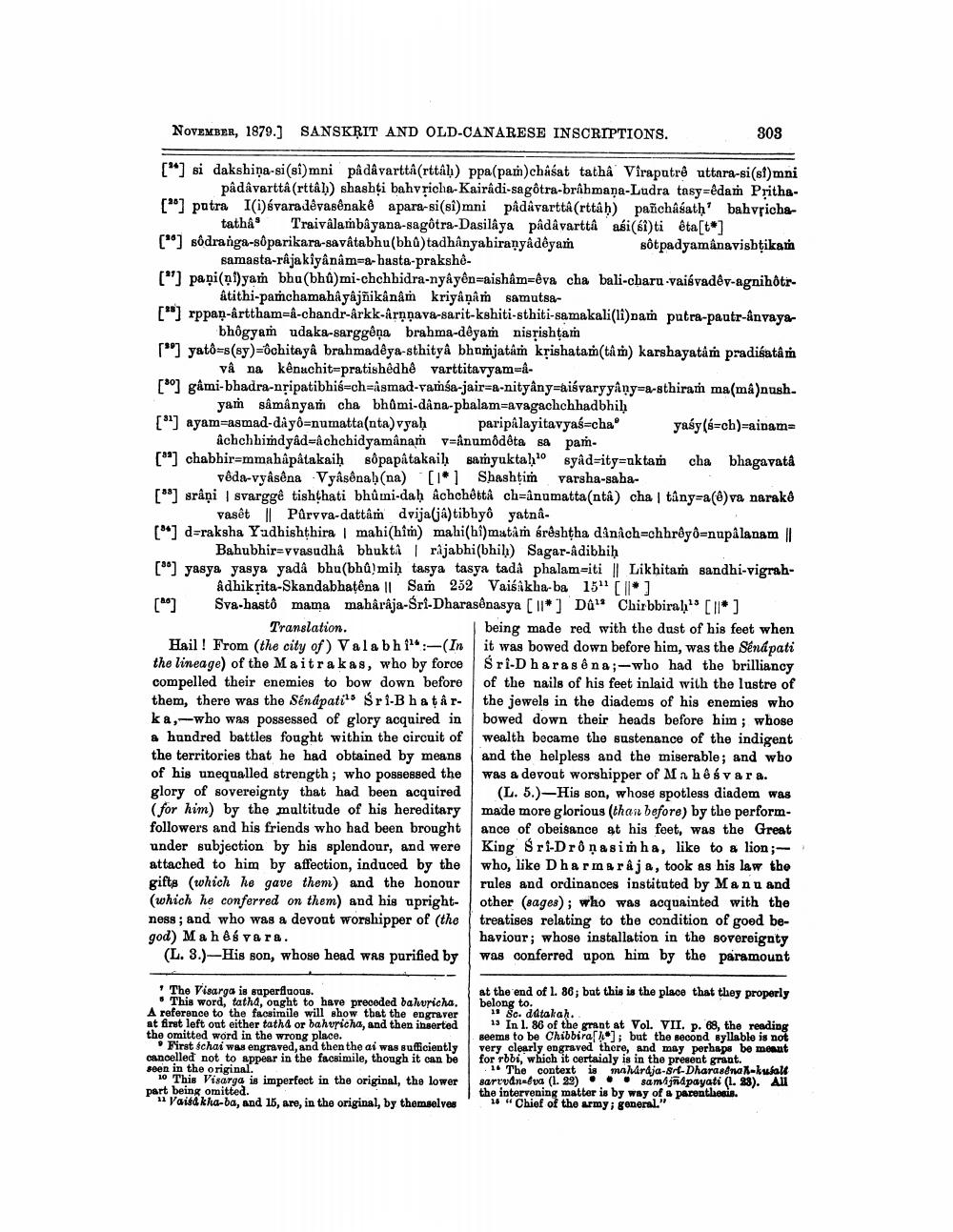________________
NOVEMBER, 1879.] SANSKRIT AND OLD-CANARESE INSCRIPTIONS.
303
[] si dakshina-si (si) mni pâdâvarttâ (rttâl) ppa(pam) châśat tatha Viraputrê uttara-si (sf)mni pâdâvartta (rttal) shashti bahvṛicha-Kairâdi-sagôtra-brâhmaṇa-Ludra tasy-êdam Pritha[2] patra I(i)svaradêvasênakê apara-si (si) mni pâdâvartta (rttáḥ) pañchâsath' bahvrichatathis Traivâlambayana-sagôtra-Dasilâya pâdâvarttâ asi(si)ti êta[t*] [*] abdesign-abparikara-savitabhu(bhů)tadhânyahiranylym samasta-rajakiyânâm-a-hasta-prakshê
adtpadyaminavishţikath
[] pani(n)yam bhu (bhú) mi-chchhidra-nyayên-aisham-êva cha bali-charu vaiśvadêv-agnihotrâtithi-pamchamahâyâjñikânâm kriyânâm samutsa
[] rppan-ârttham-a-chandr-arkk-ârnṇava-sarit-kshiti-sthiti-samakali(li)nam putra-pautr-ânvayabhogyam udaka-sarggêņa brahma-dêyam nisrishtam yats(y)-chitay brahmadlya-athitya bhajati krishata(th) karahayatim pradistâ vâ na kênachit-pratishêdhê varttitavyam=â
[*]gami-bhades-ripatibhischismad-vathia-jair-a-nitylnyaivaryyyy-a-sthirai ma(mk)nush.
yasy (é-ch)-ainam=
yam sâmânyam cha bhûmi-dâna-phalam-avagachchhadbhil [] ayam-asmad-dayô-numatta(nta) vyaḥ
paripilayitavyas-cha°
achchhimdyâd=âchchidyamânam v=ânumôdêta sa pam[] chabhir=mmahâpâtakaiḥ sôpapâtakaiḥ samyuktaḥ10 syâd-ity=uktam cha bhagavata
vêda-vyâsêna Vyâsênaḥ (na) [1] Shashtim varsha-saha
[*] srâni svarggê tishthati bhûmi-daḥ âchchêttâ ch-ânumatta (ntâ) cha | tâny=a(ê) va narakê vasêt | Pûrvva-dattâm dvija(ja) tibbyo yatnâ
[] d=raksha Yudhishṭhira | mahi(him) mahi(hi)matam érêshtha dânâch-chhrêyô-nupâlanam || Bahubhir vvasudha bhukta rajabhi (bhi) Sagar-âdibhiḥ
[] yasya yasya yada bhu(bhû) miḥ tasya tasya tadà phalam-iti || Likhitam sandhi-vigrahAdhikrita-Skandabhatêna || Sam 252 Vaisakha-ba 15" [*]
[d]
Sva-hastô mama mahârâja-Śri-Dharasênasya [11] Da Chirbbiral1 [*]
Translation.
Hail! From (the city of) Valabh :-(In the lineage) of the Maitrakas, who by force compelled their enemies to bow down before them, there was the Senapati Sri-Bhațârka,-who was possessed of glory acquired in a hundred battles fought within the circuit of the territories that he had obtained by means of his unequalled strength; who possessed the glory of sovereignty that had been acquired (for him) by the multitude of his hereditary followers and his friends who had been brought under subjection by his splendour, and were attached to him by affection, induced by the gifts (which he gave them) and the honour (which he conferred on them) and his uprightness; and who was a devout worshipper of (the god) Mahês vara.
(L. 5.)-His son, whose spotless diadem was made more glorious (than before) by the performance of obeisance at his feet, was the Great King Sri-Drô nasimha, like to a lion;who, like Dharmaraja, took as his law the rules and ordinances instituted by Man u and other (sages); who was acquainted with the treatises relating to the condition of goed behaviour; whose installation in the sovereignty
(L. 3.)-His son, whose head was purified by was conferred upon him by the paramount
The Visarga is superfluous.
This word, tatha, ought to have preceded bahuricha, A reference to the facsimile will show that the engraver at first left out either tatha or bahvricha, and then inserted the omitted word in the wrong place.
being made red with the dust of his feet when it was bowed down before him, was the Senapati Śri-Dharasêna;-who had the brilliancy of the nails of his feet inlaid with the lustre of the jewels in the diadems of his enemies who bowed down their heads before him; whose wealth became the sustenance of the indigent and the helpless and the miserable; and who was a devout worshipper of Ma hê svara.
First schai was engraved, and then the ai was sufficiently cancelled not to appear in the facsimile, though it can be seen in the original.
10 This Visarga is imperfect in the original, the lower part being omitted.
11 Vaisakha-ba, and 15, are, in the original, by themselves
at the end of 1. 86; but this is the place that they properly belong to.
1 Sc. datakaḥ.
13 In 1. 86 of the grant at Vol. VII. p. 68, the reading seems to be Chibbira[]; but the second syllable is not very clearly engraved there, and may perhaps be meant for rbbi, which it certainly is in the present grant.
The context is maharaja-sri-Dharasenak-kusalt sarvván-éva (1. 22) samijñápayati (1. 23). All the intervening matter is by way of a parenthesis. 16 Chief of the army; general."




